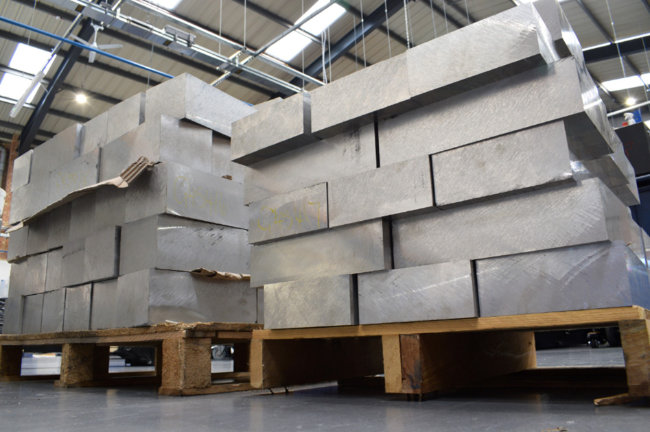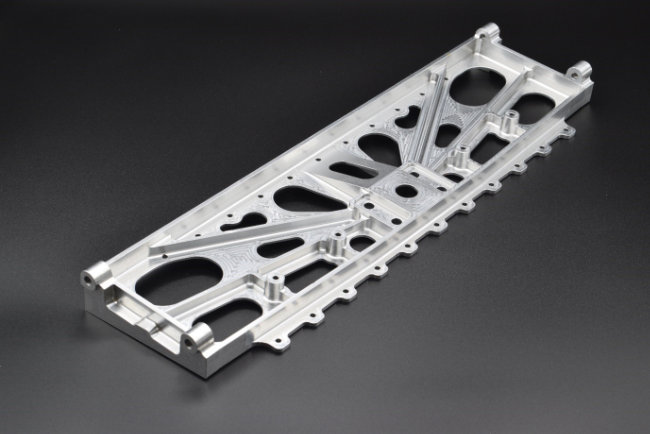 by Luke Malson
by Luke Malson
Aluminium grade selection for your next CNC machined component
Selecting the appropriate material and grade is among the important early decisions you’ll make when designing your CNC machined component that will have a knock-on effect on your supply chain, the commercial viability of your component, and whether it’s fit for purpose.
Aluminium is a versatile metal and a popular choice for CNC machined components, known especially for its high strength-to-weight ratio.
But all aluminiums are not equal! It’s vitally important to select the grade that is most appropriate for your component to meet form, fit, and function requirements as well as supply, cost, and machining factors.

Billets of aluminium 6082 T6 ready to be machined
Common aluminium alloys
There are dozens of grades of aluminium so it’s easy to see how it can get confusing and overwhelming when deciding which to choose for your application.
Here at Penta, we have a wealth of experience in machining aluminium, and we certainly have our favourites. In this blog, I’ll outline the four aluminium alloys we recommend most often, covering most applications (with a bonus one at the end).
Let’s dive in…
6082
Aluminium 6082 is the highest strength in the 6000 series and overall, a medium-strength commercial alloy. In plate form, it has become the most widely CNC machined aluminium alloy due to its low cost and good machinability, with high efficiency being easily obtainable.
6082 is used across all market sectors because it’s readily available, machines well and a range of surface treatments can be applied. Applications include but are certainly not limited to highly stressed applications, structural applications, and packaging. The aerospace equivalent “L Grades are commonly used in military, defence, and aerospace applications.
Main attributes:
- Medium strength (highest strength in the 6000 series)
- Excellent corrosion resistance
- Good weldability but strength lowered in the weld zone
- Suitable for outdoor applications
- Good machinability
- Lightweight

Soft sulfuric blue anodised housing - aluminium 6082 T6
Thoughts from the workshop floor:
“6082 is easy to source and quick delivery is achievable on most sizes. It’s also the cheapest grade of machinable aluminium. Us CNC machinists like it because it machines well, meaning less cutter wear and faster speeds and feeds, resulting in reduced cycle times. So unless your application needs the superior properties of other grades of aluminium, 6082 is a good bet.”
7075
Aluminium 7075 is known for its exceptional strength comparable to many steels. As a result, it’s a popular choice for highly stressed structural parts and safety-critical components such as rock-climbing equipment, bicycle components, and regulating valve parts.

Bracket for bike – aluminium 7075 T6
The aerospace equivalent, L95, is widely used in aerospace, nuclear and military applications. 7075 is not recommended for applications where corrosion resistance is needed.
Main attributes:
- Exceptional strength for aluminium
- Less resistance to corrosion than many other aluminium alloys
- Increased strength at sub-zero temperatures (and reduced strength at very high temperatures)
- Excellent strength-to-weight ratio
- Average machinability
Thoughts from the workshop floor:
“We love aluminium 7075 for its superior strength compared to other aluminium alloys. But beware, this strength does come at a cost. If you don’t need that extra strength, opt for a lower-cost aluminium such as 6082.”
5083
5083 is a medium-strength aluminium alloy and the highest strength of all non-treatable aluminium alloys. It’s particularly known for its exceptional performance in extreme environments, including its resistance to saltwater and chemicals, making it a popular choice in marine and petrochemical industries.
Main attributes:
- Exceptional performance in extreme environments – high resistance to seawater and chemical environments
- Highest strength of all non-treatable aluminium alloys – medium overall strength
- Fair machinability
- Retains excellent strength after welding
- Not recommended for use in applications which exceed 65°C
Thoughts from the workshop floor:
“5083 has good ductility for the strength level. Take note that the material size range and availability is far more restricted than 6082, so is recommended only where the properties are required.”
2014A
2014A aluminium is a readily available high-strength grade of commercial aluminium. It is commonly used for high-strength structural components and high-technology market applications. Supplied in a fully heat-treated condition, 2014A is a 4-5% copper alloy.
The aerospace equivalents are L93 (plate), L157 (sheet) and L168 (bar) which are used to make aerospace fittings, military vehicles, aircraft structures, truck frames, and weapons.

Aerospace component – aluminium L168 T6
Main attributes:
- Exceptionally high strength
- Very good machinability
- Heat treatable and retains good strength after heat treatment
- Poor resistance to atmospheric attack, especially in marine environments (therefore often hard anodised)
Thoughts from the workshop floor:
“2014A has high strength but poor corrosion resistance. Parts are often anodised in order to protect the surface of the metal. It’s great for parts needing good strength up to 150°C. Should the extra strength not be critical, aluminium 6082 which has excellent corrosion resistance, may be a better and cheaper option.”
6061
I couldn’t write a blog about aluminium grades and not mention 6061. We get a lot of enquiries about 6061 but the truth is, it’s much more commonly used in America.
My advice is to steer clear of 6061 and instead opt for 6082 which has very similar properties but is much more readily available in the UK, with quicker lead times and significantly lower cost.
Aluminium 6082 vs 5083 vs 7075 vs 2014A
Let’s take a look at the 4 main aluminium grades side by side…
|
|
6082 |
7075 |
5083 |
2014A |
|
Composition |
Aluminium, Silicon Magnesium, Manganese |
Aluminium, Zinc, Magnesium, Copper, Chromium |
Aluminium, Magnesium, Manganese, Titanium, Chromium |
Aluminium, Copper, Silicon Manganese, Magnesium |
|
Machinability |
Good |
Fair |
Fair |
Very good |
|
Strength |
Medium |
Very High |
Medium |
High |
|
Cost |
Low |
High |
Medium |
Medium to High |
|
Corrosion resistance |
Excellent (except salt water) |
Fair |
Excellent |
Poor |
|
Weldability |
Good |
Poor |
Good |
Excellent resistance/spot/beam, otherwise poor |
|
Ductility |
Medium |
Moderate |
High |
Moderate |
|
Fatigue Strength |
Medium |
Medium to High |
Medium |
Medium |
|
Thermal Conductivity |
High |
Medium |
High |
Medium |
|
Electrical Conductivity |
Medium |
Low to Medium |
Medium |
Medium |
There is no one-size-fits-all when it comes to selecting an aluminium grade for your CNC machined component. For an ‘all-rounder’ material with good properties, low cost, and ease of availability, I recommend aluminium 6082.
However, if you need a higher strength, you will want to closely look at 7075 or 2014A and if you need excellent corrosion resistance in salt water, 5083 could be just what you need.
Making a decision
The reality is that selecting a material is amongst the most important decisions you’ll make about your component design and it’s not something you want to rush or skim over.
To get you started in your research, here at Penta, we have put together a comprehensive materials resources area of our website which breaks down all the common materials and grades we encounter regularly.
Next steps
If you need further guidance, I highly recommend seeking the expertise of a CNC machining company. Here at Penta, we offer a precision aluminium CNC machining service that includes material recommendations as well as optimising your design for machining and cost efficiency.
To start a no-obligation conversation, give the Penta team a call on 023 9266 8334 or email .
